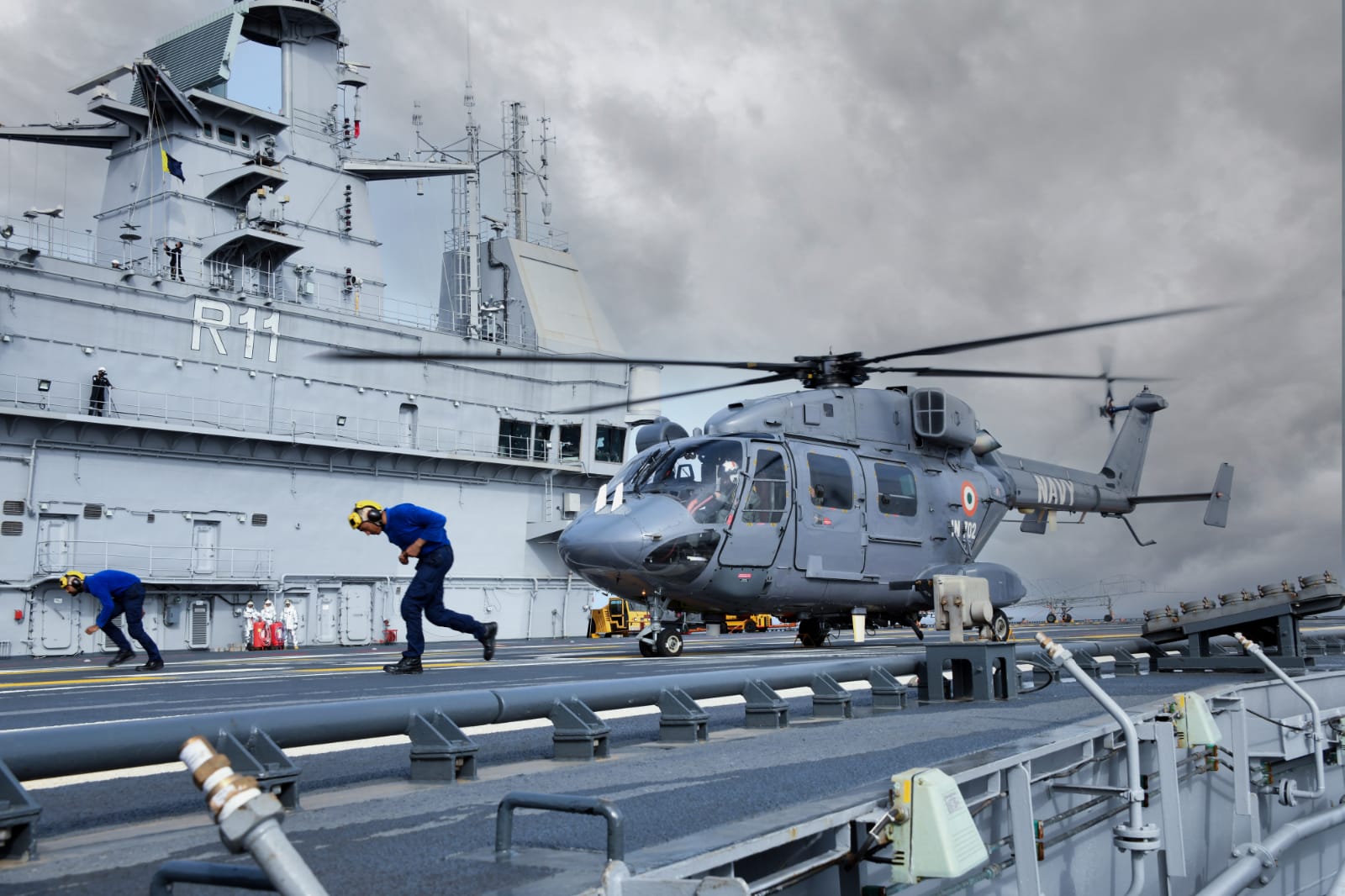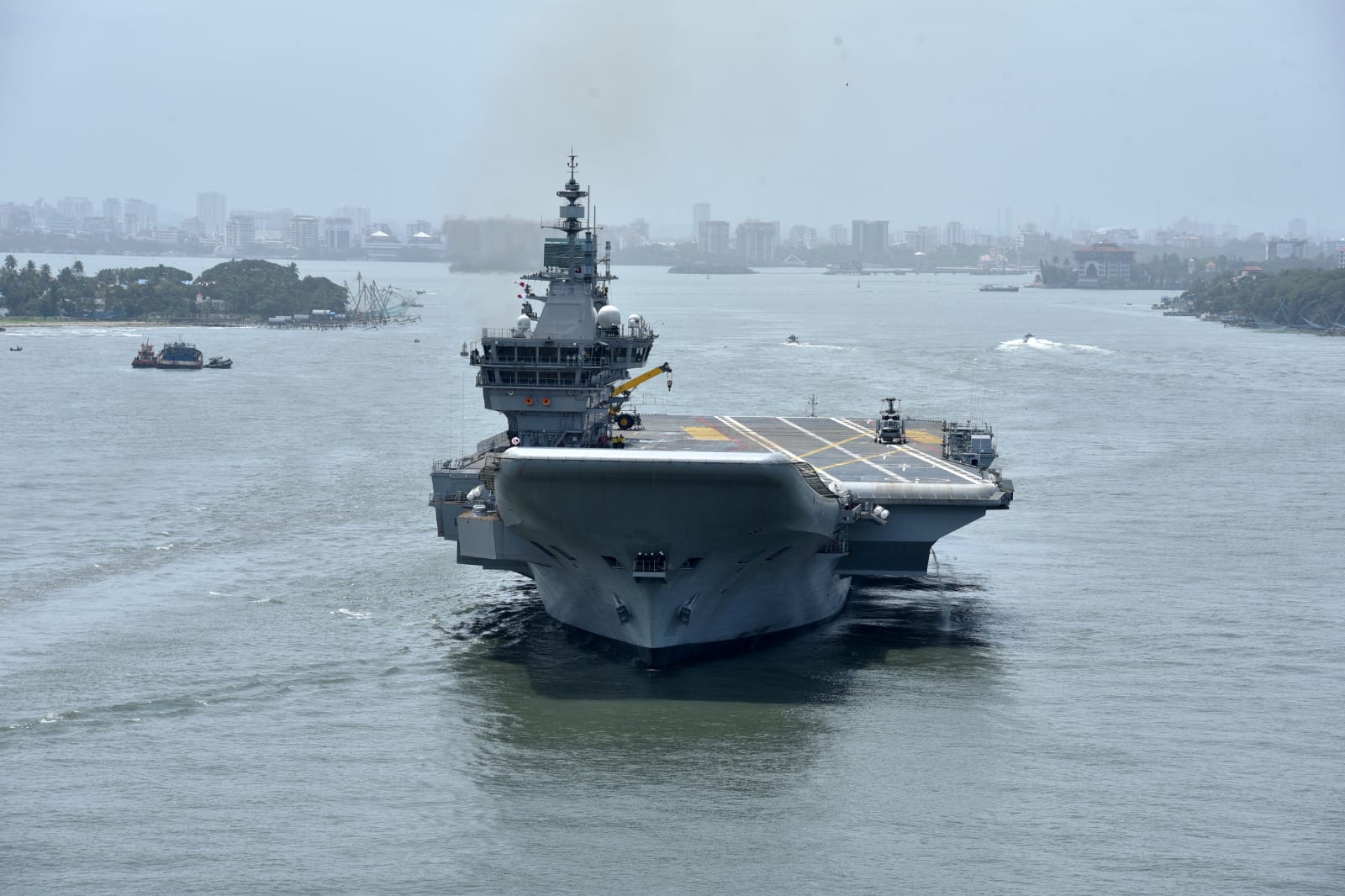The Indian Ministry of Defense (MoD) announced on July 10 that India’s first indigenous aircraft carrier (IAC-1) Vikrant had completed the fourth and final phase of sea trials. The images released have since caught the internet by storm due to a very intriguing MiG-29K display onboard.
Three wheels are photographed aboard the carrier in the background of an indigenously manufactured Advanced Light Helicopter (ALH). These three wheels are positioned to resemble the wheelbases of a fighter jet and can be seen linked to something that barely resembles an airframe.
The rare object resembling an aircraft sans an airframe led netizens to discuss what it could be. Upon close inspection, however, it becomes clear that it is a wireframe replica of a deck crew aircraft. The Indian Navy currently uses this MiG-29K multirole fighter for carrier operations at INS Vikramaditya.

A wireframe is a skeletal blueprint or framework that outlines the basic design and functions of an aircraft and is not like a typical mock-up or prototype made of a solid airframe. A wireframe is a 3D design and looks clear or transparent instead of completely resembling the aircraft.

Indian Defense Journalist shared a photo on Twitter and wrote: “Since everyone is asking and everyone (including me!) is confused – there is a NON-FLYING MiG-29K on board Vikrant, along with a WIRE-FRAME aircraft dummy. Both are being used to test various elements of the aviation complex.”
Since everyone is asking and everyone (including me!) is confused – there is a NON-FLYING MiG-29K on board Vikrant, along with a WIRE-FRAME aircraft dummy. Both are being used to test various elements of the aviation complex. https://t.co/El21quNtJ5 pic.twitter.com/Ta01SbklMs
— Angad Singh (@zone5aviation) July 10, 2022
EurAsian Times reached out to the former Vice-Admiral of the Indian Navy, Shekhar Sinha, for perspective.
He said, “The ship belongs to Cochin Shipyard (CSL). It is not the Navy’s ship till it gets commissioned. CSL could have made a wireframe to get an idea of parking space, maneuvering on the deck, wing tip clearances from the superstructure, spots for parking from where fuelling hoses could reach, etc.
They may have requested the Naval Flight Test Squadron to get associated with the preliminary preparations. The test pilots and Flight Test engineers would have assisted in getting the wireframe manufactured.”
US, UK, China Also Use Mock-Ups
Carrier deck crews would potentially use the flimsy wireframe for training drills requiring movement across the deck, in and out of the launch and recovery areas, the elevators, and inside the carrier’s hangar bay. However, operations like refueling would not take place.
“One cannot fuel a wireframe but can ascertain where all on the deck aircraft can be after recovery to ensure that fuelling hoses reach the fuelling point on aircraft from the outlets fitted on the sides of the flight deck,” said Vice Admiral Sinha (retd).
Angad Singh pointed out the similar mock-up used on board the INS Vikramaditya. At the same time, the Kiev-class carrier was being refurbished to fit better the Indian Navy was a helicopter mock-up.
However, it was designed to address the same idea and may suggest that the carrier deck crews of the Indian Navy regularly use such wireframes in their training.

It’s not the first time a fighter jet mock-up has been used for training carrier operations, as several militaries worldwide have embraced the concept. However, not all have aircraft carriers. The main distinction between India’s wireframe and the mock-ups used by other countries like the US, the UK, and China is that they have significantly greater substance and depict their aircraft in solid form.
China has essentially embraced this idea as well. In June 2021, a photo emerged of the mock-up of a stealthy fighter jet identified as FC-31 at China’s dedicated naval research and testing facility in Wuhan, Hubei province.
Concurrently, this specific development proved that China was modifying its stealthy light-to-medium weight land-based fighter jet for carrier missions.
An allegedly quite recent image of the carrier EM facility at Wuhan and the mock up representing today how the Type 003's island might look like has gained a SAC FC/31/J-35 mock up! ?
Any idea since when exactly it is there since my last image is from April/June 2019. ? pic.twitter.com/QFifx59dhK
— @Rupprecht_A (@RupprechtDeino) June 8, 2021
Even the US Navy conducts training onboard its carriers using retired airframes for crash recovery exercises, firefighting drills, and ground handling instruction. At least one derelict airframe on America’s flattops is frequently visible and looks like a flyable aircraft.
The US Navy and the British Royal Navy have also used life-size prototypes of their fighter jets aboard their respective carriers. The crew uses the life-size models to practice maneuvering the aircraft on the ship effectively, as the MiG-29K wireframe is designed to do but with a more structured and solid airframe and no engines.
India’s IAC Vikrant To Soon Get New Fighters
After finishing its fourth phase of sea trials this past weekend, INS Vikrant is geared to be inducted into the Indian Navy. The ship will reportedly have up to 30 fighters and helicopters, including Kamov-31 helicopters and MH-60R multirole helicopters, in addition to the MiG-29K.

The French Rafale M and the F/A-18E/F Super Hornet, two western aircraft types vying for a contract with the Indian Navy, could eventually be included among the ship’s fleet of aircraft.
“The ship has been designed with the MiG-29K as its operating aircraft in mind. Therefore, on commissioning, the trials of MiG-29K will commence after necessary trials and calculations ashore/SBTF.
The ship will operate with MiG-29K. Replacements are in the realm of the future. Aircraft Carrier cannot sit idle till replacement aircraft is decided, contract signed, and delivery begins. It is a very long drawn process,” said Vice Admiral Sinha when asked if the MiG-29K, whose wireframe has been sighted, would be used in the long run.
The aircraft carrier is slated to be commissioned in August this year. It will give more teeth to the Indian Navy, challenged by China’s growing presence in the Indian Ocean.
- Contact the author at sakshi.tiwari9555@gmail.com
- Follow EurAsian Times on Google News




